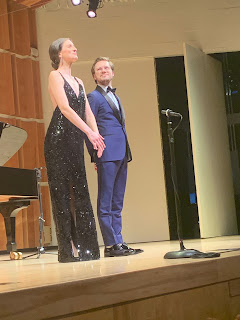 |
| Mary Beth Nelson and Francesco Barfoed |
It isn't every day that we get to hear two talented mezzo-sopranos on the same program and to observe how very different two artists from the same fach can be--as different as yin and yang or as fire and ice Both were dazzling in different ways. Both shared a highly engaging manner and the ability to make the audience feel welcome and involved.
Each chose her own program comprising material that was meaningful to herself. We found our own self wishing that they had not announced their respective themes, inasmuch as it was the way each chose to interpret the material and perhaps not the way we in the audience might understand it. It reminded us of the "Director's Notes" in a playbill announcing what the director was trying to say. Readers have heard me before opining that a work of art should speak for itself.
Several singers were nominated by their respective voice teachers at Juilliard to audition and then these two were selected by a panel of judges to participate in last night's Vocal Arts Honors Recital at Merkin Hall. This annual recital has always been a highlight of the vocal scene.
The first half of the program was performed by Mary Beth Nelson and Collaborative Pianist Francesco Barfoed. The first set was a setting of Three Poems of Christina Rossetti, a Victorian poet who came from an artistic family, including a famous Pre-Raphaelite painter.
We found the contemporary settings by David Conte to be more interesting in the piano part than the vocal part. Ms. Nelson's approach was elegant, sophisticated, and spare of gesture, as appropriate to the content of the text, which was largely about death. In our opinion, the text didn't ask for music and stands alone as poetry, enjoyable if you love poetry. It felt to us as if Ms. Nelson's gorgeous instrument (which we have very much enjoyed on prior occasions, when she sang Rossini and Strauss) was searching for a melody that wasn't there. Nonetheless, we enjoyed some personal touches such as the ritardando on the closing "think it long" of "Rest" and the emphasis on the recurrence of the phrase "calling me" in "A Hope Carol". The expressive lower register fell lightly on the ear--quite a change from the coloratura that we have admired on prior occasions.
We also enjoyed Mr. Barfoed's playing of the sometimes dense score, especially the extended postlude of "Echo".
The second set comprised three lieder by Schubert that were completely unfamiliar to us. We must have heard them ten years ago when Lachlan Glen produced a year long and exhaustive survey of Schubert's 600 plus lieder. We would love to tell you that we were thrilled to discover "new" Schubert lieder but in all honesty, we cannot. We did not hear the melodic invention nor feel the rhythmic thrust that enthralls.
"Verklärung" is a setting of Alexander Pope's "Transfiguration" translated into German by Johann Gottfried Herder--still more on the theme of death. The piano part was powerful with alternating lyrical parts. The variety of pacing and dynamics held one's interest and it was a story that Ms. Nelson relished telling.
Similarly, the setting of Franz von Bruchmann's "Schwestergrüss" gave Ms. Nelson a story to tell, a ghost story! Schubert wrote it with phrases occurring in ever ascending registers and Ms. Nelson gave this device full measure to build the drama. We also liked the insistent piano in the lower register.
Christoph Kuffner's "Glaube, Hoffnung, und Liebe" seemed to occupy more familiar territory, offering an interesting alternation of major and minor mode. We loved the way Schubert ended the lied with a firm resolution in the piano.
We were left admiring Ms. Nelson's vocal gifts and the will to take the audience to unfamiliar places. Yet, the selections were not our taste and we were left wanting an encore of "Non piu mesto" or "Una voce poco fa".

No comments:
Post a Comment